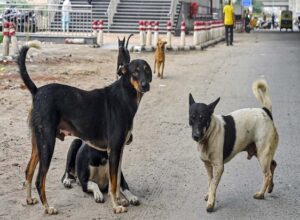The bench declared its intention to involve the Animal Husbandry Departments and Municipal Authorities of each State and Union Territory in order to broaden the scope of the case.

In a landmark ruling, the Supreme Court on Friday changed its earlier August 11 ruling, stating that stray dogs—aside from those with rabies or acting aggressively—must be returned to their original locations following appropriate sterilisation and vaccination.
The Supreme Court firmly declared that it would no longer be acceptable to feed stray dogs on public streets.
“It is forbidden to feed stray dogs in public areas, and those who do so will face the proper consequences,” the three-judge panel, which included Justices Vikram Nath, Sandeep Mehta, and N.V. Anjaria, declared. On August 14, the bench had previously postponed rendering a decision.
Taking into consideration the number and density of stray dogs in each municipal ward, the court ordered the Municipal Corporation of Delhi to create specific feeding areas for stray dogs.
The public must be made aware that feeding stray dogs is only permitted in these areas by means of notice boards that prominently display these designated areas.
The court urged the establishment of helplines for reporting infractions, highlighting the necessity of improved infrastructure. It also stated unequivocally that no person or group should prevent officials from carrying out their responsibilities.
Additionally, the court ordered that each of the NGOs involved in the case receive ₹25,000, which would be used to establish facilities. Additionally, it prohibited them from submitting any more legal arguments in this case.
The bench declared its intention to involve the Animal Husbandry Departments and Municipal Authorities of each State and Union Territory in order to broaden the scope of the case.
Dog lovers had strongly objected to the order issued on August 11. Senior advocates Kapil Sibal and Abhishek Manu Singhvi, speaking on behalf of petitioner NGOs, responded by requesting a stay of the order, claiming that there were not enough shelter homes to accommodate the stray dogs.
Sibal argued that the matter is already governed by parliamentary legislation and the Animal Birth Control (ABC) Rules.
He questioned, “What have they been doing all these years?” in an attempt to criticize the Municipal Corporation of Delhi (MCD). Have they constructed shelters? Have they implemented sterilisation initiatives? He maintained that dog populations had increased and that communities had taken on the responsibility of caring for the strays as a result of the MCD’s failure to fulfill its obligations.
Sibal cautioned that if shelters aren’t found, the dogs may be put down. Singhvi backed up Sibal’s claim, stating that the August 11 order violated earlier directives that forbade the mass euthanasia of stray dogs.
Advocate Nanita Sharma brought up the issue before Chief Justice B.R. Gavai on behalf of an NGO. She called attention to the existence of contradictory rulings from two distinct Supreme Court benches and asked for clarification.
“The government has done nothing,” the court said during the August 14 hearing, expressing strong disapproval of the local authorities’ inaction. Nothing has been done by the local authorities. Everyone who files an intervention here needs to accept accountability.
The August 11 order, which instructed civic authorities in Delhi-NCR to start removing stray dogs from all localities within eight weeks and to place them in designated shelters, was not stayed by the court in spite of these arguments.
On behalf of the Delhi government, Solicitor General Tushar Mehta provided data indicating that there are roughly 3.7 million dog bite cases in India annually, or roughly 10,000 every day.
Additionally, he referenced data from the World Health Organization (WHO) showing that 20,000 people die from rabies each year.
Mehta emphasized how stray dog populations are making it harder for kids to play outside and contended that even vaccinated dogs can still be dangerous, especially to young ones.
He explained that for the sake of public safety, the government was supporting the separation of stray dogs from residential areas rather than their killing.
The court criticized the MCD earlier in the hearing for not putting laws and policies into practice.
Laws are framed by parliament, but they are never put into effect. Those who love animals are protesting, while people are suffering. The bench had declared that all parties submitting interventions were required to provide affidavits and supporting documentation.
Rahul Gandhi, the leader of the Congress, praised the Supreme Court’s updated guidelines on stray dogs on Friday, calling them a positive step in striking a balance between public safety and animal welfare.
The Lok Sabha’s Leader of the Opposition added that the strategy is grounded in scientific logic and compassionate.
“The Supreme Court’s updated guidelines on stray dogs are a positive step in striking a balance between public safety and animal welfare,” Gandhi wrote in a post on X.
He claimed that the strategy was “both compassionate and rooted in scientific reasoning.”